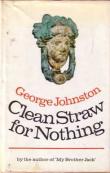 4864800341838700831.jpg
4864800341838700831.jpg
 4864800341838700831.jpg
4864800341838700831.jpg
'Set against the backdrop of a Greek island, Clean Straw for Nothing follows the story of successful war correspondent and retired journalist David Meredith as he abandons his career for a life in exile with his beautiful wife Cressida. Johnston focuses on the developing relationship between David and Cressida, exploring the complex and reflective character of David as he questions the nature of success, sexual tensions, expatriation and ill-health. The questions are almost entirely unanswerable and the freedom David craves nearly impossible.'
— publisher's website
'Fifty years after Clean Straw for Nothing won the prodigal Australian writer George Johnston a second Miles Franklin award, the novel has aged as a rich critique of social change, cultural complacency and the rise of smug nationalism in Menzies-era Australia.' (Introduction)
'In one of her many essays, Charmian Clift writes of the melancholic experience of feeling like a photograph. She has been asked to address a group of students at Wollongong High School, a school she had attended, and in preparing her speech she turns to a photograph that appears in the school's fiftieth-anniversary commemorative booklet. The photograph depicts a class from Clift's time at the school, 'formally posed with the boys lined up behind the girls and their hands resting on the girls' shoulders' ('On Turning slightly Sepia', p. 48 (see References below)), and as photographs do it evokes in Clift's memory small details that are not evidenced in the image itself: 'I can still see one of those girls arched in a perfect swallow dive, and remember precisely a collar of little pearl buttons on a blue crepe dress that another of them wore to an end-of-term dance that year'(48). The photograph also prompts Clift to consider how different her teenage circumstances were from those of the students she is to speak to, their faces shining with the confidence that faith in the goodness of the future affords. Before those faces now momentarily turned to her, she thinks of herself as the past, and wonders, 'if they realized that standing up before them I knew myself to be curling at the edges and turning slightly sepia' (51).' (Publication abstract)